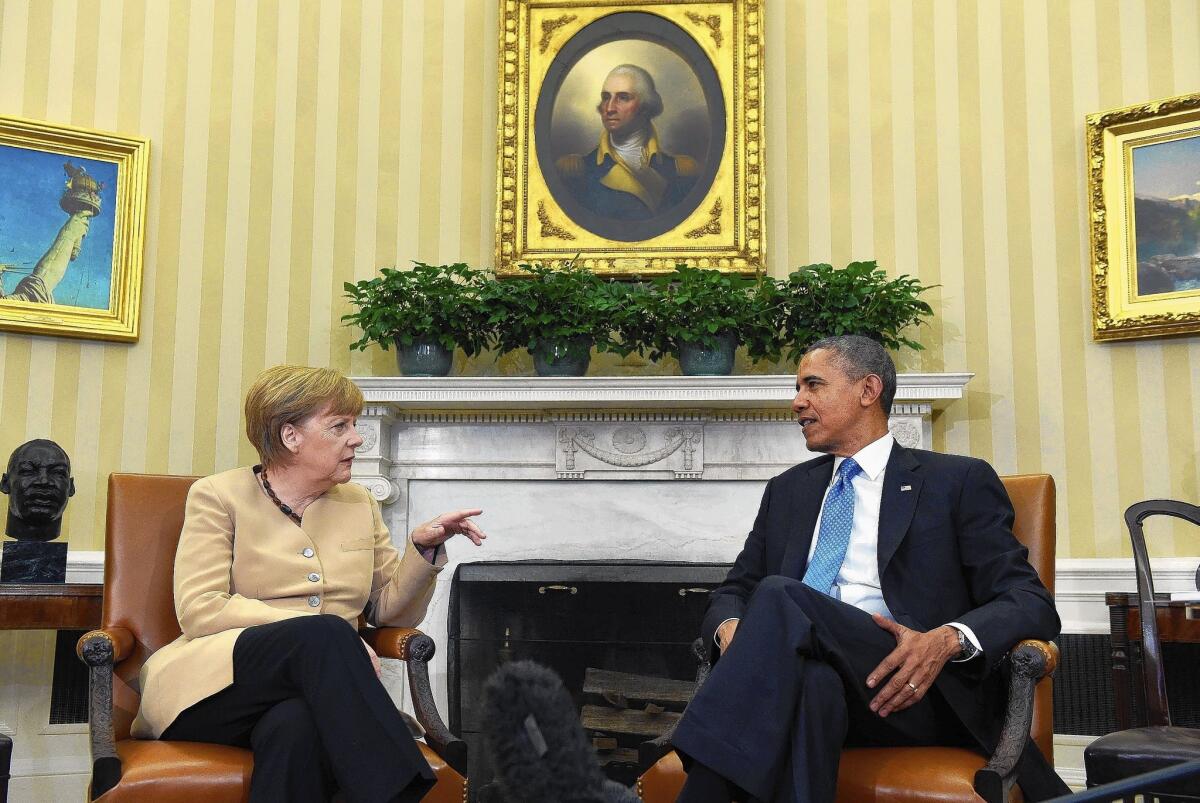U.S., Germany fail to reach surveillance agreement

- Share via
Reporting from Washington — Ruling out a “no-spy agreement” with any country, President Obama acknowledged Friday that the United States had not reached a deal with Germany to limit U.S. surveillance on its territory.
The U.S. and Germany have been negotiating over mutual rules for intelligence-gathering aimed at each other, but “there are still some gaps that need to be worked through,” Obama said during a White House news conference with German Chancellor Angela Merkel.
Merkel characterized those gaps as “differences of opinion” over “issues, for example, of proportionality and the like.” Germany’s leading news magazine, Der Spiegel, has reported that German officials have pressed the U.S. for an agreement not to spy but have been rebuffed.
“We do not have a blanket no-spy agreement with any country,” Obama said. “What we do have are a series of partnerships and procedures and processes that are built up between the various intelligence agencies.”
The conflict between the two allies stems from revelations last year by former National Security Agency contractor Edward Snowden that exposed U.S. spying on Germany, including the monitoring of Merkel’s personal cellphone. The disclosures also led Der Spiegel to publish an article in October about NSA operations at the U.S. Embassy in Germany headlined, “The NSA’s Secret Spy Hub in Berlin.”
Obama, who met with Merkel in the Oval Office, said his administration was committed to “a U.S.-German cyber dialogue to close further the gaps that may exist in terms of how we operate” and “to make sure that there is transparency and clarity about what we’re doing and what our goals and our intentions are.”
On Friday, he sought to soothe tension with Germany, an essential ally in many of his foreign policy goals, by reassuring Germans that they were not being targeted by an espionage dragnet.
“We have shared with the Germans the things that we are doing,” Obama said. “I will repeat what I’ve said before, that ordinary Germans are not subject to continual surveillance, are not subject to a whole range of bulk data-gathering.”
Last month, Der Spiegel reported that NSA documents showed 300 references to Merkel in a database of targeted foreign leaders. In recent weeks, a German member of parliament said Merkel had asked to see the fruits of the NSA’s spying on her, but the request had been denied by American officials, according to a representative for the German Interior Ministry. U.S. officials declined to comment.
Some U.S. officials have said it was unwise to target Merkel, but others said German leaders were unsurprising objects of American spying, given the extent to which German and American interests often diverge in international affairs.
As one example, Joseph Wippl, a former senior CIA officer who served in Germany, noted that “Germany has a relationship with Russia, and I think it really behooves us to understand that relationship.”
In a speech to the U.S. Chamber of Commerce after her meeting with Obama, Merkel said her concerns had not been met.
“In a nutshell, the end never justifies the means, and not everything that is technologically feasible should be done,” she said.
More to Read
Sign up for Essential California
The most important California stories and recommendations in your inbox every morning.
You may occasionally receive promotional content from the Los Angeles Times.











